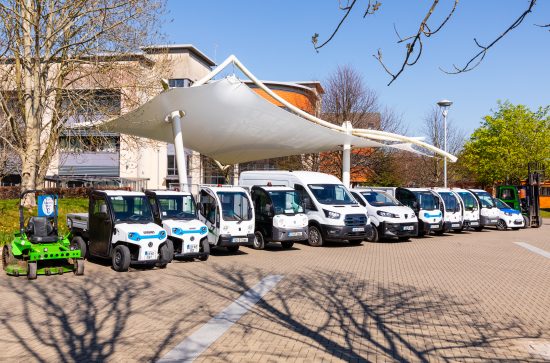
Image: The thirteen electric vehicles currently in service on campus, supporting sustainability efforts
and cleaner operations.
Maynooth University Estates team is proud to announce the completion of its transition to an all-electric vehicle fleet,
marking a significant milestone in the university’s ongoing commitment to sustainability and climate action.
The journey began back in 2015 with the purchase of the first Goupil electric vehicle, which replaced a diesel van
for on-campus deliveries. The narrow track of the Goupil allowed it to navigate between bollards that had pedestrianised
the campus core, enabling it to service both the North and South sides of the campus. This innovative solution quickly
demonstrated its advantages, leading other units within Estates to follow suit.
Over the years, the transition to electric vehicles (EVs) gained momentum, with several more Goupil EVs added to
replace diesel vehicles. The change was not limited to smaller vehicles: in recent months, the last two larger diesel
vans were replaced with an Electric Ford Transit, equipped with a lifting tailgate for the transport team,
and a Peugeot E-Professional for the Maintenance team.
Today, MU Estates operates a fleet of nine electric vehicles, including an electric ride-on mower and an electric
forklift, and the transition is now complete. In addition, our campus service providers have embraced the move
to electric vehicles: Bidvest Noonans (Cleaners) now use a Goupil, MasterChefs (Caterers) utilise two Goupils
for deliveries, and MCR Security employs a Mullen Go car for patrols.
As part of the university’s broader climate strategy, the electrification of the Estates fleet aligns with the public
sector climate action mandate, which stipulates that only zero-emissions vehicles should be procured from the
end of 2022. This initiative also supports the university’s Climate Action Roadmap, which aims to reduce
greenhouse gas emissions by 51% from the 2016-18 baseline by 2030, with the elimination of diesel fuel
purchases playing a key role in achieving this target.
The removal of diesel vehicles from the campus core has made the environment quieter and the air cleaner in
pedestrian areas, contributing to a more sustainable and enjoyable campus experience for all.
